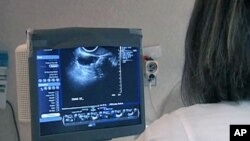A new study shows that screening for ovarian cancer does not prevent deaths and may promote unnecessary surgery.
Marsha Rifkin's mother found out too late that she had ovarian cancer. "She was only 49, a few days away from her 50th birthday," she said.
She died of ovarian cancer, leaving behind five daughters who get tested every year. Ovarian cancer is one of the leading causes of cancer deaths among women. If it is caught early, the five year survival rate is 90 percent.
Most women are diagnosed when the disease is advanced and the chances of living five more years drop to 30 percent.
Ultrasound is one of the screening tools used to detect this type of cancer.
Doctors also use blood tests to screen for the disease. But now, a major new study finds there is really no point in screening women who don't have a history of the disease or symptoms of it.
Dr. Saundra Buys is the medical director of the Huntsman Cancer Institute in Salt Lake City. "Screening for ovarian cancer does not detect ovarian cancer at a stage where it's more likely to be cured," she noted.
Dr. Buys and other researchers conducted a study involving 78,000 women between the ages of 55 and 74. They randomly assigned the participants to receive either annual screening or usual care. None of the women had a family history or symptoms of ovarian cancer, although some women in each group developed it during the course of the study.
“The women who had cancer turned out to have the same stage of cancer and were no more likely to be cured of cancer than women who weren't screened," she said.
Dr. Buys says the screening did more harm than good. She says 10 percent of the women who were screened had false positive results which, in some cases, led to unnecessary surgery and complications. The symptoms for ovarian cancer are like those for digestive or bladder problems. They can include lower back or pelvic pain.
The researchers are urging women to report any change to their doctors so that if they do have ovarian cancer, it might be caught early.
The study was published in the Journal of the American Medical Association.











